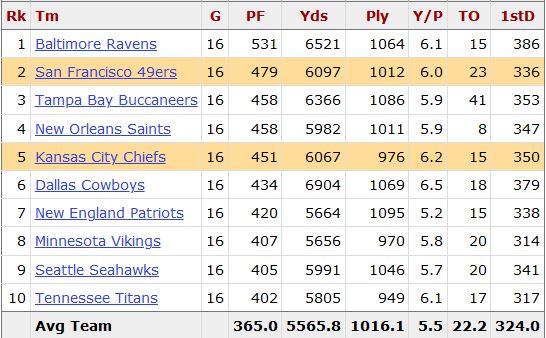It’s safe to say that the Chiefs rely on their quarterback, Patrick Mahomes, a lot more than the 49ers rely on Jimmy Garoppolo. More often than not, these Super Bowls have ended with the better team winning, and the better quarterback losing.
The most extreme example is probably Super Bowl XLVIII between the Seahawks and Broncos. Seattle had a great defense and a very good running game, with an efficient but low-volume quarterback. Denver had the best quarterback in the NFL. Does that sound familiar? Of course, as we all know, the Seahawks blew out the Broncos.
Five years earlier, in Super Bowl XLIII, the Steelers were a much more balanced team than the Cardinals. Arizona had Kurt Warner, Larry Fitzgerald, and Anquan Boldin, but Pittsburgh was driven by its top-ranked defense. Ben Roethlisberger had been interception prone during the season, and the Steelers passing attack was average at best for most of 2008. Still, Pittsburgh emerged victorious.
And while you likely don’t remember it, Super Bowl IX is another good comparison to this year’s game. Minnesota had Fran Tarkenton, who was arguably the top quarterback in the NFC in 1974, but the defense had fallen from its golden days of the late ’60s and early ’70s. Meanwhile, Pittsburgh ranked 1st or 2nd in most of the key defensive categories but had a young and unproven quarterback in Terry Bradshaw. The Steelers were not very reliant on their quarterback, while Minnesota was: and in the Super Bowl, the dominant defense carried the day.
A counter example comes from 2006 in Super Bowl XLI. The Bears had an interception prone quarterback in Rex Grossman and an outstanding defense, while the Colts were obviously carried by Peyton Manning. This time, the dominant quarterback’s team won, although it was the running game and the defense (or maybe the absence of a passing game for Chicago) that really led Indianapolis to victory.
How about one of the greatest upsets in pro football history, in Super Bowl XLII? We don’t often think of this game as a “great QB vs. a balanced team” sort of game, because New England was just so much better than New York during the regular season. But the Giants passing game was below-average during the regular season and the defense was better than average, while the Patriots were defined by their passing game. In the Super Bowl, the Giants defensive line dominated the game, and led to a huge upset.
Another lopsided game was Super Bowl XXIV between the ’89 49ers and ’89 Broncos. While San Francisco was the better team overall, and 13-point favorites, the Broncos were certainly the more balanced team. The 49ers passing offense was off the charts good during the regular season, while Denver’s defense finished 1st in points allowed and 3rd in yards allowed. The 49ers blew out the Broncos in the most one-sided game in Super Bowl history.
Let’s close with two more games that featured upsets by the “balanced/defense” team over the “star QB team”. In Super Bowl 50, the Broncos had a great defense while the Panthers had the league MVP at quarterback. And in Super Bowl XXXVII, the Bucs had a great defense while the Raiders had the league MVP at quarterback. In both games, the dominant defense stole the show.
Will Super Bowl LIV follow a similar trend? I’m a bit surprised to see the Chiefs as 1.5-point favorites in this game. While no game is a perfect mirror of any other game, there are many similarities between this 49ers/Chiefs game and several of the games on the above list. And we know that the 49ers were the better team overall this season. Even Super Bowl XXV, between the Giants and Bills, matches this trend. That game didn’t make the list because the Giants passing attack during the regular season was very good, but that was mostly with Phil Simms; if you consider the Giants team that made the Super Bowl as a balanced/defense-heavy team going up against a high-octane offense, that’s another mark in favor of the 49ers on Sunday.
So what methodology did I use to come up with these results? The full explanation below. [continue reading…]



